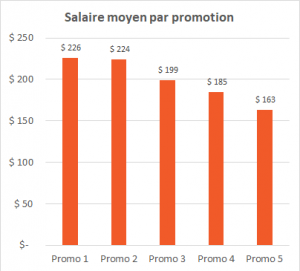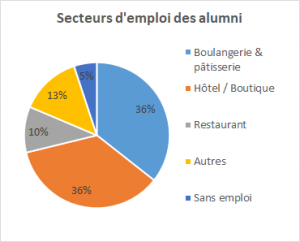Between 2014 and 2019, our Pastry school has seen 5 intakes of students and 80 young women have graduated from our professional training programme. What have they become? Let’s take a look at their different paths and their current situation in a Cambodia which is booming, but where there are still many disparities..
The Survey
The Bayon social team carried out a survey early 2020 on 80 alumni with the following aims:
- Analysing the impact of the pastry/baking training in the employability of the young women
- Noting their personal satisfaction in their current job
- Understanding the level of income that they earn in order to live a decent life.
Out of 80 alumni, 65 took part in the survey (by telephone or via an online form), which represents 81% of our former students.
Here are some key figures:
- 86% of the students questioned are currently in employment with 14% not working (unemployed, maternity leave or further studies at university). Three quarters of them work in Siem Reap.
- The average wage for our former students, across the five different intakes, is $190 per month.
- None of those surveyed plans to change jobs and 9 out of 10 are fully satisfied with the skills acquired during the training programme in Bayon Pastry School. They have also confirmed that these skills are extremely useful on a day-to-day basis.
82% of the former students surveyed are currently working in the hotel & restaurant sector and so are using the skills they acquired in Bayon daily.
A reasonable wage in Cambodia.
Although Cambodia introduced a legal minimum wage of $170 (for the textile sector) in January 2018, a large majority of the population does not earn that amount. The students who graduate from the Bayon Pastry School are generally recruited at an average wage of $163 for the first year. This wage increases quite quickly and they can earn up to 15% more in their second year.

The average wage of the graduates surveyed is 190 $/month (excluding those who are not currently working). We can see a clear link between the years of experience and the salaries which increase by 40% over 5 years. When asked “Can you live comfortably and without extra help on your salary?”, 3% (2 graduates) confirmed that they were living comfortably and 89% thought that they were just scraping by.
Meeting their own needs and supporting their families.
The data above illustrates how precarious the situation is for the families of our graduates: many have debts to pay back and as soon as a member of the family can meet his/her own needs with a regular wage, he/her must support the family. Of the 65 alumni questioned, 61 indicated that they were sending money back to their family each month. The amounts for 75% of them varied from $50 to 150$ per month; in other words, up to half of their wage.

KOLA – Former student, training a new student at her new job.
The Role of Bayon School.
Our role is to train young women for a practical profession which will allow them to access the workplace quickly, where they can earn a decent, sustainable wage. For most of them, a large chunk of this salary will be sent to their family, which gives our young graduates the impression that they are just scraping by. However, we do need to remind them that our training programme is relatively new, but that the salaries do increase over the years with experience: +40% over 5 years. Most importantly, we need to remind them that it is the whole family which is better off; brothers and sisters who can go to school, grandparents who can get medical treatment and women who can be proud of having brought about this change.

